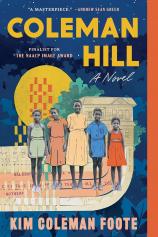Coleman Hill
Review
Coleman Hill
In 1982, Audre Lorde published ZAMI: A New Spelling of My Name and called it a “biomythography.” What she meant by this term (which she coined herself) was that she was presenting her memoir and threading it with mythology. The mythic embellishments are at once emotional and necessary, reflecting the complicated history of African Americans and nuanced layers of identity and experience.
Taking inspiration from this narrative form, Kim Coleman Foote offers a stunning debut novel, COLEMAN HILL. Like Lorde’s classic, it takes a true story and adds fictional elements that render it more (not less) real and true. The Coleman and Grimes families are caught in a cycle of trauma, poverty and violence. The book focuses on the ways in which they sink into this cycle and rise above it, searching for love, acceptance and purpose.
"Coleman Foote is so adept at illustrating the humanity of her characters...as well as the seemingly insurmountable obstacles they face.... This singular and memorable tale is a literary gift."
In 1916, Lucy Grimes and Celia Coleman leave their homes in the South for a new life in the American North as part of the Great Migration. They find their way to Vauxhall, New Jersey, where they each marry and begin their families. But for the two women and their descendants, the promise of freedom and opportunity remains mostly unfulfilled. The racism they experienced in Alabama and Florida, and the slavery their parents and grandparents endured, is not the distant memory they hoped it would be when they settled in Vauxhall. The legacies of fractured family, abuse, colorism and fear remain powerful even as the women dream of better futures and limitless possibilities. Coleman Foote traces the drama of the two families, and the branches on the family trees where they intertwine, with honesty and compassion.
Lucy marries Solomon, and her daughter, Bertha, falls in love with Cecila’s beloved son, Jeb. Bertha and Jeb’s relationship eventually ends Lucy and Celia’s friendship, and the tensions calcify over the years, helping to ruin Bertha and Jeb’s already fraught and abusive marriage. Celia is quick to hit and harm, and Lucy hides in her religion. Their children and grandchildren inherit the power of their personalities and vices to varying degrees. After many years with Jeb, and as the object of his rage and scorn, Bertha is cast out by Celia and rejected by Lucy. She also must leave her children behind. They are raised by Celia, whom they fear and hate, and thus another generation grows up feeling lost and dislocated. Many years later, though, the terrible stories of their past give the youngest members of each family a chance to engage with and understand those who came before them.
COLEMAN HILL is a novel of survival and strength, and how the American experiment has failed Black people for generations. Coleman Foote is so adept at illustrating the humanity of her characters --- their strengths, weaknesses, desires, mistakes, regrets and passions --- as well as the seemingly insurmountable obstacles they face. There is much sorrow and pain, but there is also resilience and spirit. The author herself is proof of that. Included throughout the book are photographs of her relatives, who are biomytholographized here, which force readers to confront the truths she is telling and ask them to celebrate the lives she has recorded. This singular and memorable tale is a literary gift.
Reviewed by Sarah Rachel Egelman on September 22, 2023
Coleman Hill
- Publication Date: September 17, 2024
- Genres: Fiction, Historical Fiction, Women's Fiction
- Paperback: 336 pages
- Publisher: Zando – SJP Lit
- ISBN-10: 1638931704
- ISBN-13: 9781638931706




